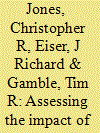| Srl | Item |
| 1 |
ID:
111351


|
|
|
|
|
| Publication |
2012.
|
| Summary/Abstract |
In 2007 the UK government's public consultation on the future of nuclear power courted much criticism. Three studies were conducted to assess whether key arguments used by government within this consultation might have influenced public opinion about the technology. Participants first read a passage of text that made salient certain positive (climate change mitigation, increased energy security) or negative (nuclear waste) aspects of the nuclear debate. Participants then completed a task that required them to create an electricity mix for the UK by varying the contributions made by each of five energy sources (coal, gas, nuclear, renewables and electric import). Study 1 seemed to indicate that pitching the debate in terms of climate change mitigation was effective in increasing endorsement of nuclear power. The results of studies 2 and 3, however, contested this conclusion, suggesting that these arguments were having little direct impact upon participants' preferences for nuclear power. The results of these studies hold implications for UK energy policy and attitude assessment and can contribute to the understanding of how the arguments used by government in the 2007 consultation might have influenced public opinion.
|
|
|
|
|
|
|
|
|
|
|
|
|
|
|
|
| 2 |
ID:
107629


|
|
|
|
|
| Publication |
2011.
|
| Summary/Abstract |
The level of 'wind-prospecting' presently occurring in the UK is increasing the likelihood that new wind-power developments will conflict with other existing and/or proposed schemes. This study reports multiple-regression analyses performed on survey data obtained in a region of the UK (i.e. Humberhead Levels, near Doncaster) simultaneously subject to nine wind-farm proposals (September 2008). The aim of the analysis was to identify which survey-items were predictors of respondents' estimates of the number of wind turbines they believed the region could reasonably support (i.e. capacity estimates). The results revealed that the majority of respondents would endorse some local development; however, there was substantial variability in the upper level that was considered acceptable. Prominent predictors included general attitude, perceived knowledge of wind power, community attachment, environmental values, visual attractiveness of wind turbines, and issues relating to perceived fairness and equity. The results have implications for Cumulative Effects Assessment (CEA) - and in particular the assessment of Cumulative Landscape and Visual Impacts (CLVI) - and support calls for greater community involvement in decisions regarding proposed schemes.
|
|
|
|
|
|
|
|
|
|
|
|
|
|
|
|